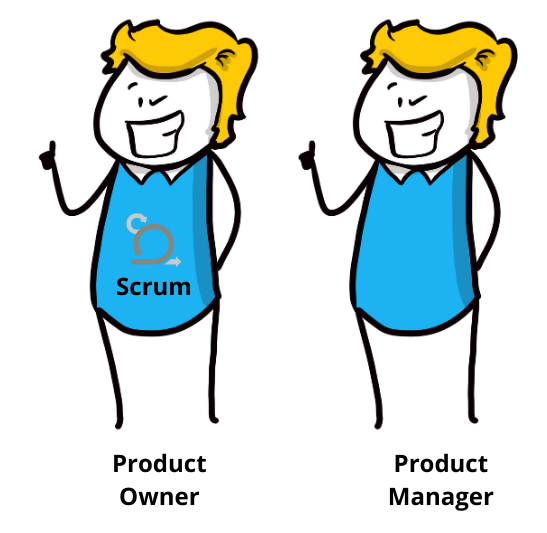TL;DR, the only difference is the fact that the Product Owner leverages Scrum to run product management activities, whereas the Product Manager is not tied to Scrum. They wear different shirts, if you will.

Roy, the PO in Solving for Value
"Is it really that simple?" Yes, yes it is.
Product management activities
So this means there is no Product Manager in Scrum? Correct! This does not mean the skills of a Product Manager are not important in Scrum. In fact, many (if not all) the activities of product management are done by the Product Owner in the context of Scrum. I can already hear the screeches of radical disagreement on this blog, and that's all good. The problem many organizations run into is the creation of a hierarchy and a chain of command, i.e., skewed empowerment of either of these two.
After speaking for countless hours with industry giants in the Scrum world, the Agile world, and the Silicon Valley world, I've noticed a recurring pattern; the job description every single one of those people is talking about is exactly what a Product Owner does, bar the Scrum framework. Another pattern I noticed is the misunderstanding of the Product Owner's accountability. Especially in the Silicon Valley region, it appeared that what is understood to be the Product Owner is in fact nothing more than a proxy at best. During the Professional Scrum classes, we specifically describe this as one of the least desirable effects and a total lack of empowerment (yet it persistently exists in many organizations). Feel invited to join my classes and discuss there 😁.
"What about the Head of Product, Product Director, Chief Product Officer, etc?" Well, that's a whole different beast to slay (which we do in The Anatomy of Product, available December 1st). Ultimately, they don't have any overruling decision-making authority internal to the product itself. The Product Owner (or Product Manager) remains in charge of the product in every aspect.
Empowerment is key
After yesterday's LinkedIn post blew up, I needed to write it down more elaborately. The fact that we're still having this discussion in 2025 makes it painfully clear that Scrum isn't dead, nor is Agile. I've worked with and seen many clients say Agile doesn't work for them. But zooming in on the Agile Manifesto, those four simple lines aren't even appropriately executed. Something you never tried to make come to life can't be dead either. And that's where it all starts. Get the foundation in order. Make sure we're aligned on whatever that foundation is. Empower those who are closest to the information and allow them to make the decisions they need to make. Otherwise, we'll be adding a manager to manage the micromanagers before we even realize it.
